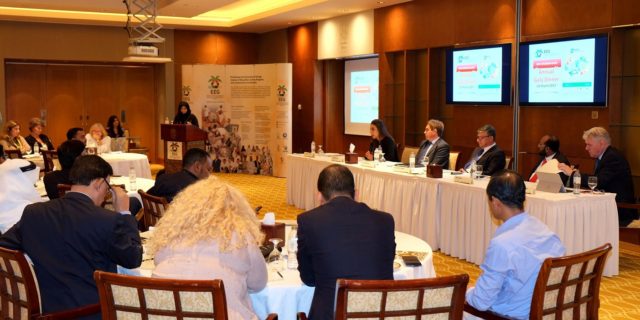Session draws on experiences of leading international experts to highlight greener & more sustainable supply chain
UAE, March 14, 2017 – With the aim to throw the spotlight on the importance of supply chain sustainability, the Emirates Environment Group (EEG), the UAE’s leading environmental group, and Arabia CSR Network, the regional think tank, recently co-organized a panel discussion on ‘Sustainability of the Supply Chain,’ in collaboration with the United Nations Environment Programme (UNEP) at the Emirates Palace in Abu Dhabi. Supported by the Emirates Green Building Council and sponsored by Adeeb Group, the session highlighted insights, experiences and recommendations for ensuring sustainability across the supply chain and mobilizing commitment from various sectors.
The panel was opened by Habiba Al Marashi, Chairperson of the Emirates Environmental Group, and included experts from various sectors and establishments such as the Abu Dhabi Quality and Conformity Council, Adeeb Group, Unilever, Interserve, and the Neutral Group. The highly popular session was attended by officials representing a number of sectors and industries, including oil and gas, aviation, facilities management (FM), catering, consultancy, education, food and packaging, and trading, among several others.

Al Marashi said: “The objective of supply chain sustainability is to create, protect and grow long-term environmental, social and economic value for all stakeholders involved in bringing products and services to the market. By organising such brainstorming sessions and panel discussions, we aim to mobilise different sectors to not only help them understand but also share strategies for ensuring a feasible supply chain that can support the overall sustainable development of businesses.”
Carlos Amaya, Senior Specialist at the Abu Dhabi Quality Conformity Council, focused on the Council’s product certification services and its benefits to manufacturers, suppliers and consumers, highlighting the sustainability element of the Abu Dhabi Trustmark for Environmental Performance. Eng. Ansari, CEO of the Adeeb Group, on the other hand, shared key insights on their supply chain CSR & Sustainability, meeting sustainability commitments and regulatory compliance, supply chain evaluation, and their role in mobilising suppliers and promoting sustainability across the supply chain with SMEs.
Likewise, Alistair McGregor of Interserve Engineering and Construction, Middle East highlighted the activities of the Interserve Sustainable Procurement Working Group and the importance of sustainable procurement. Moreover, he demonstrated how the company achieved compliance with British Standard 8903: 2010 on sustainable procurement. He further elaborated their Sustainable Procurement Policy and Practice Framework that can aid in developing practical measures for organisations to achieve permanency for their sustainable procurement ambitions.
Mai Khairalla, Customer Service Manager at Unilever explained the company’s Sustainable Living Plan that facilitates the Gulf initiatives, covering all areas across the value chain and building reputation with stakeholders and partnering with customers on various sustainability aspects. Lastly, the Neutral Group discussed the essential steps in designing a sustainable supply chain strategy, some common mistakes, and case studies showing how much money can really be saved by going green.
Al Marashi moderated the event and thanked the speakers and the audience for their active participation, interest and contributions. She aptly summarized that the Sustainability of the Supply Chain is based on knowledge, understanding and responsible behaviour from all stakeholders and the society at large.
“A green and sustainable supply chain ensures that the environmental, social and economic impacts are efficiently managed while encouraging the best practices in good governance throughout the lifecycles of products and services. It helps organisations to minimize their carbon footprints by reducing greenhouse gas (GHG) emissions and improving water sustainability to considerably cut down environmental risks across their supply chains and expand their circle of responsibility,” concluded Al Marashi.
The sustainability of the supply chain remains one of the most hotly debated topics within the realm of responsible business and one of the most challenging aspects of Corporate Sustainability. Experts, thought leaders and practitioners across the world continue to deliberate on the need, means and benefits of integrating social, environmental and governance aspects into supply chain decisions. The concept is closely linked to the management of risks and opportunities and an imperative for creating value for stakeholders in an organisation’s value chain.
EEG, a renowned and established organisation within the region, is best known for its range of community engagement activities and its facilitation of action programmes for building awareness and creating a culture of sustainable behaviour. Through such panel discussions EEG provides a platform for expert business leaders, senior government officials, and influential academics and researchers to share their knowledge and findings with the community and utilize the latest ground-breaking technologies, solutions and future plans to build an informed and sustainable society.
